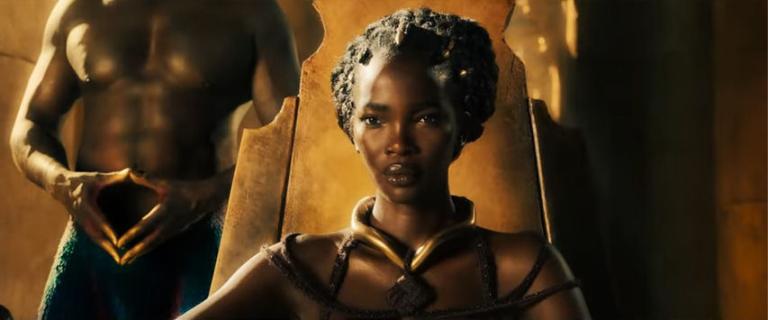MOVIES: Three Thousand Years of Longing - Review
11 Sept 2022
MJ Movies ReviewsThree Thousand Years of Longing is as radical a departure from Mad Max: Fury Road as George Miller’s entry to the Mad Max franchise was from Babe: A Pig In The City; no wonder then - does it seem offputting to the general audience and hasn’t found the word of mouth that it’s looking for, although minimal advertising certainly hasn’t helped. Instead what we get is presented to us, so we’re told - as a fairy-tale - which sets out to ask the question - in an age of modern technology, is there still a need for myth and legend? Or is modern technology itself, now the myth and legend of the twenty-first century? A Djinn appears to us before our eyes then – played by Idris Elba, in possibly a career best performance - who has three thousand years of stories to tell, and three wishes to grant to the one woman who believes her life content and happy. In real contrast to those who the Djinn encountered before; Tilda Swinton’s Alithea Binnie takes pride in her solitude, and is unable to come up with a wish that she wants to grant – believing her life to be perfect as is.
The Djinn’s stories are completely lavish and beautiful; acting as a lense into history – fables being repurposed through lense of affection, desire, passion – tragedy brought about by human emotion and the triumph of hate and love. The likes of King Solomon are featured here, as myth and history are woven into one. Elba’s commanding narration acts as a guiding hand and we find meaning, emotion and purpose guided to us through his character, we, like Tilda Swinton’s, experience a sense of loss and longing. Human emotion is on fully display, every ounce of it - if you expected an epic of the more traditional Ridley Scott - or even the controlled insanity of the Daniels Brothers and their ilk you’re going to be disappointed, instead, Three Thousand Years of Longing is rife with personal conflict, real and imagined, Miller taking an audaciously big scaled storyline and presenting it to us on the smallest possible stage – allowing for an intimate affair of the soul.
Elba and Swinton’s performances are the main driving force throughout this narrative, impressively rich and you buy their feelings to one another that they develop as the movie progresses. There’s chemistry there - and they sell every second of it to work. The dialogue allows for some unexpected one-liners: when asked as to where Alithea’s ex-husband is now, she deadpans “Hackney”, to a Djinn who has never been - yet this is as much his journey as it is hers; we learn more about why she is content with her loneliness, her childhood imaginary friend and past – it’s rich with character-defining moments sparkled inbetween the Djinn’s story – he is the main focus of the flashbacks, which predominate the narrative, but to claim it is only flashbacks feel misguided – there is a lot more to Three Thousand Years of Longing than initially appears on the surface.
For what feels like a lifetime high fantasy stories have been ill equipped to tackle the current digital age, often brushed aside in post apocalyptic terrains like See and Terry Brooks’ Shannara Chronicles; but Three Thousand Years of Longing tackles the subject head on: what happens when the fantasy meets the modern world? It’s Miller’s audacious answer to that question – tackling the subject head on presented in a way this would be told to us. It tackles love, freedom and technology in more ways than one – maybe mis-marketed when it received any marketing at all as you won’t be getting a maximalist fantasy romp - but it’s the much more grounded approach that really makes this one work for me. Miller’s eye for beauty and detail makes every setting throughout history come to life, and London far more beautiful than it is – a sense of colour and richness to every period and every character gives this film the edge that it needs to shine. You may not process all of it on a first viewing; but the further removed, the more likely you are to appreciate it.
Sign Up for the SpoilerTV Newsletter where we talk all things TV!




